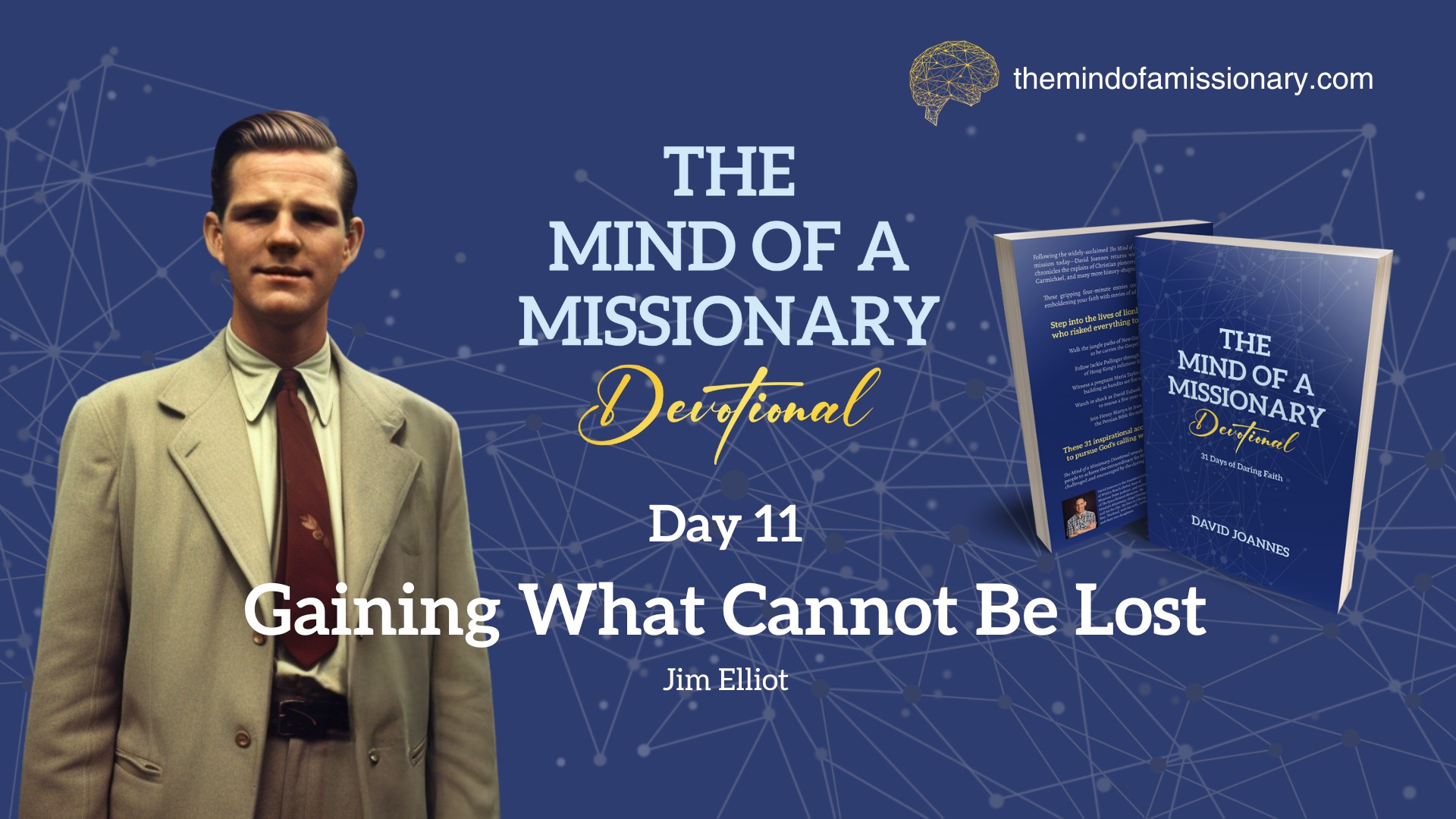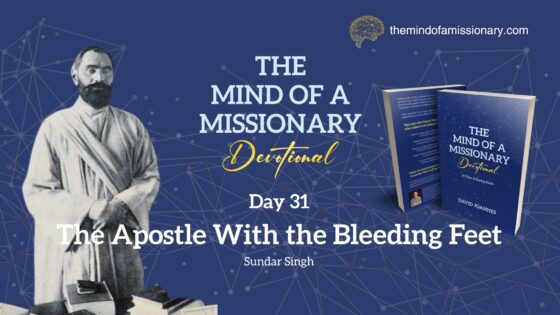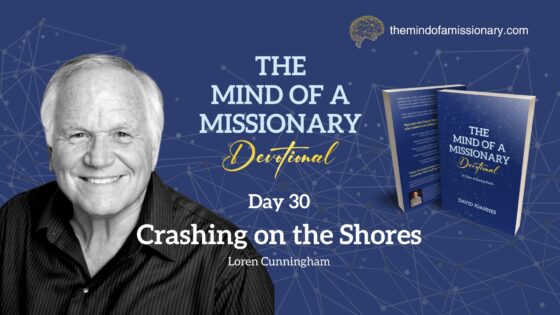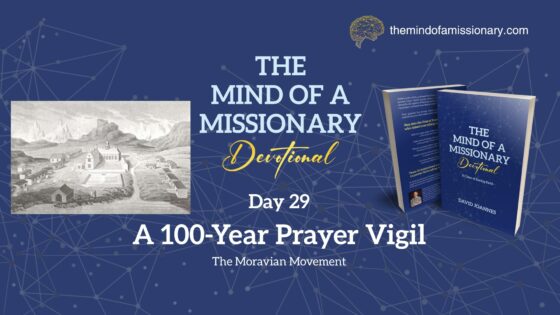Day 11
The Mind of a Missionary Devotional
Gaining What Cannot Be Lost
Jim Elliot
“For whoever wants to save their life will lose it, but whoever loses their life for Me will find it.” — Matthew 16:25
In the dense jungles of eastern Ecuador, the hum of a yellow Piper PA-14 airplane pierced the silence. Below, the serpentine Curaray River meandered through the thick foliage, a lifeline for the inhabitants of the remote region. Onboard the plane, Jim Elliot scanned the landscape, searching for the huts of the Waorani tribespeople on September 19, 1955.
Joining Jim were fellow missionaries Ed McCully, Roger Youderian, Pete Fleming, and their pilot, Nate Saint. Collectively known as the “Ecuador Five,” the men dropped gifts from the plane, hoping to build trust. Jim’s voice echoed over the jungle as he called out aerial messages of “I like you! I like you!” through a loudspeaker. But the jungles held secrets, and the Aucas were unpredictable.
The five missionaries understood the risks of bringing the Gospel to the Waorani, also known as the “Auca,” a pejorative word meaning “savage.” Though the unreached people group was notorious for their violent tendencies toward outsiders, the men were driven by a simple yet profound conviction: “Our orders are: the Gospel to every creature.” The hope of the Gospel was intended for everyone, and the missionaries were convinced that included the Waorani tribe, too.
During the months leading up to the mission, aptly named Operation Auca, Jim’s wife, Elisabeth, reminded him of the dangers and what might happen if he went. “Well, if that’s the way God wants it to be,” was his calm reply, “I’m ready to die for the salvation of the Aucas.”
On January 3, 1956, before their flight to Waorani territory, the five men closed their prayer time with the hymn, We Rest On Thee:
We rest on Thee, our Shield and our Defender!
Thine is the battle, Thine shall be the praise;
When passing through the gates of pearly splendor,
Victors, we rest with Thee through endless days.
As the plane touched down on a sandy strip they named “Palm Beach,” they waited with bated breath for a face-to-face encounter with the Aucas. On January 6, two Waorani women and a man emerged from the jungle. Jim’s heart swelled with anticipation, believing they were on the brink of a spiritual breakthrough.
However, the story took a tragic turn. Two days later, Auca tribesmen ambushed the missionaries’ camp, killing all five men. The corpses were found days later; Jim’s body was completely eaten away from the hips up after being submerged under a log in the river. The news of their deaths sent shockwaves around the world. On January 30, LIFE Magazine ran a ten-page article entitled “Go Ye and Preach the Gospel: Five Do and Die.” Many questioned the purpose and cost of the missionaries’ efforts. The mission, it seemed, had ended in tragedy.
But God works in mysterious ways. The story didn’t end with their deaths. Instead, it birthed a legacy of forgiveness and redemption. In an extraordinary act of grace, Elisabeth Elliot, Jim’s widow, and Rachel Saint, Nate’s sister, moved in with the Waorani three years later, living among the very people responsible for their loved ones’ deaths. Their presence and persistent love eventually led to the tribe’s transformation. Many Waorani, once hostile to the Gospel, embraced Christianity, including some of those involved in the killings.
The blood of the Ecuador Five became the seed for a spiritual harvest. Their sacrificial lives affirmed the Scripture’s truth: “And we know that in all things God works for the good of those who love Him, who have been called according to His purpose” (Romans 8:28). Today, eighty percent of the Waorani (population 1,900) have heard the Gospel message, with forty percent professing Christian faith—an inconceivable number in 1956.
“Was it the thrill of adventure that drew our husbands on?” Elisabeth Elliot later wrote in her best-selling book Through Gates of Splendor. “No. These men did not go out as some men go out to shoot a lion or climb a mountain. Their compulsion was from a different source. Christ was to be obeyed. God’s command, ‘Go ye, and preach the Gospel to every creature,’ was the categorical imperative. The question of personal safety was wholly irrelevant.”
Whether God calls us to the jungles of Ecuador or our next-door neighbor, we are all called to live sacrificially, prioritizing God’s Kingdom above our own desires. Jim Elliot lived and died selflessly, saying, “He is no fool who gives what he cannot keep to gain what he cannot lose.” He inherited a crown that lasts forever by giving up his temporal body. Passing beyond this world, he walked through the splendid gates of God’s city, paving the way for the Waorani tribe to follow.
– Personal Response –
Passage: For whoever wants to save their life will lose it, but whoever loses their life for Me will find it. (Matthew 16:25)
Point: True gain comes when we surrender everything in our lives to Christ.
Ponder: Are you clinging to comfort and safety, or are you willing to risk everything for the sake of the Gospel?
Prayer: Lord, teach me to live with eternity in view. Help me let go of temporary things so I can gain what truly lasts. In Jesus’ name, amen.
Proclamation: I will not live for myself, but for the One who gave everything for me. Recognizing that my life is not my own, I dedicate all I am and all I have to Christ and His cause.
Practice: Take one bold step today to obey God’s call. Share your faith, serve someone sacrificially, or give generously, trusting that God will use your obedience for His glory.
Learn more about The Mind of a Missionary Devotional at themindofamissionary.com




